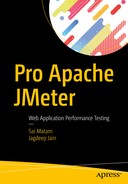In many companies, performance testing is not a priority until it becomes critical. The engineering team is then asked to complete performance testing in an extremely short time. Most of us are familiar with this situation and can relate to it. The engineering team needs to come up to speed with performance testing in general and with performance testing tools in a very short time.
In spite of realizing how critical performance testing is, companies often don’t have an adequate budget for the needed commercial performance testing tools. Apache JMeter (hereinafter referred to as “JMeter”) is the leading tool, and thankfully it is open source and thus is free.
While there is plenty of reference material on the Internet, there is no comprehensive guide to take you through all the steps of creating, running, and interpreting the results of a performance test using JMeter. This book aims to address this need.
This book discusses the basics and presents a framework for performance testing. You will be able to create a performance test plan that is based on the requirements. This book follows a step-by-step approach and guides you through the installation, configuration, test plan creation, execution, and result interpretation using JMeter.
Why Performance Testing?
Why bother to test the runtime performance of a web site? The answer is much more important than you realize. Improved web site performance directly translates to the bottom line (profitability) of a business, as it provides a better user experience, builds the brand, and retains customers. The improved performance uses fewer resources and utilizes them with more efficiency.
The current generation of web users is very demanding and discerning. They have short attention spans. They want everything quick. Twenty years ago a study revealed that a web site should load within six seconds or the user would click elsewhere! This was 20 years ago. Imagine what that attention time would be now? Four seconds? Financial Times (FT) conducted a performance test that clearly showed that a slow web site resulted in a bad user experience and negative financial impact. Even a delay of one second, over a long period of time, can have a huge impact on revenues.1
Why JMeter?
JMeter is an industrial-strength performance testing tool. It is a top-level Apache open source project. But being free is not the only reason for its popularity. It’s a very capable tool. This mature tool has been continuously revised since its inception in 2001.
The commercial tools may have fancier user interfaces or better-looking reports, but JMeter can be configured to provide the same capabilities. JMeter can be run in “distributed mode” in the cloud, generating the load of thousands of users. JMeter comes with an Apache License, which does not have any restrictions on usage, distribution, or modification.
JMeter has a standard format for writing the performance test. Most of the commercial tools support importing/exporting to the JMX (the JMeter test file format).
Footnotes
1 Chadburn, Matt, Lahav, Gadi; “A Faster FT.com.” Engine Room, Blog by the Financial Times Technology Department, April 6, 2016, http://engineroom.ft.com/2016/04/04/a-faster-ft-com/ .
